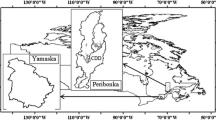Abstract
Long-term or seasonal forecasting is crucial for the management of large water systems. Advances in catchment hydrology, such as mathematical models of catchment processes, are proven to be capable of creating reliable streamflow forecasting systems. In this study, the limits of predictability of streamflow in a snowmelt-dominated river basin are examined and a new illustration of the forecast efficiency across different issue dates and lead times—the so-called “forecastability map”—is demonstrated.
Similar content being viewed by others
References
Bulygina, O.N., Razuvaev, V.N., and Aleksandrova, T.M., Description of daily air temperature and precipitation data set from Russian meteorological stations and from some meteorological stations over the former USSR territory (TTTR) 2017. Retrieved from https://doi.org/meteo.ru/english/climate/descrip11.htm.
Dong, Chunyu, Remote sensing, hydrological modeling and in situ observations in snow cover research: A review. J. Hydrol., 2018, vol. 561, pp. 573–583. https://doi.org/10.1016/J.JHYDROL.2018.04.027
Gelfan, A.N., Moreydo, V.M., Motovilov, Y.G., and Solomatine, D.P., Long-term ensemble forecast of snowmelt inflow into the Cheboksary Reservoir under two different weather scenarios, Hydrol. Earth Syst. Sci., 2018, vol. 22, no. 4, pp. 2073–2089. https://doi.org/10.5194/hess-22-2073-2018
Kuchment, L.S. and Gelfan, A.N., Long-term ensemble forecast of snowmelt runoff with the help of the physics-based models of runoff generation. Russ. Meteorol. Hydrol., 2007, vol. 32, no. 2, pp. 126–134.
Kuchment, L.S. and Gelfan, A.N., A study of effectiveness of the ensemble long-term forecasts of spring floods issued with physically based models of the river runoff formation. Russ. Meteorol. Hydrol., 2009, vol. 34, no. 2, pp. 100–109.
Lettenmaier, D.P., and Waddle Terry R. Forecasting Seasonal Snowmelt Runoff: Summary of Experience with Two Models Applied to Three Cascade Mountain, WADrainages, 1978, Seattle, Washington.
Motovilov, Y., Gottschalk, L., Engeland, K., and Rodhe, A. Validation of a distributed hydrological model against spatial observations. Agric. For. Meteorol., 1999, vol. 98–99, pp. 257–277. https://doi.org/ 10.1016/S0168-1923(99)00102-1
Motovilov, Yu.G., Hydrological simulation of river basins at different spatial scales: 1. Generalization and averaging algorithms. Water Resour., 2016, vol. 43(3), pp. 429–437. https://doi.org/10.1134/ S0097807816030118
Motovilov, Yu.G., Hydrological simulation of river basins at different spatial scales: 1. Generalization and averaging algorithms, Water Resour., 2016, vol. 43, no. 3, pp. 429–437. https://doi.org/10.1134/ S0097807816030118
Nash, J.E. and Sutcliffe, J.V., River flow forecasting through conceptual models, part—A discussion of principles. J. Hydrol., 1970, vol. 10, no. 3, pp. 282–290. https://doi.org/10.1016/0022-1694(70)90255-6
Report of a Workshop on Predictability & Limits-To-Prediction in Hydrologic Systems, 2002, Washington, DC: The National Academies Press. https://doi.org/10.17226/10337
Shukla, S., Sheffield, J., Wood, E.F., and Lettenmaier, D.P., On the sources of global land surface hydrologic predictability, Hydrol. Earth Syst. Sci., 2013, vol. 17, no. 7, pp. 2781–2796. https://doi.org/ 10.5194/hess-17-2781-2013
Author information
Authors and Affiliations
Corresponding author
Rights and permissions
About this article
Cite this article
Moreido, V.M. Assessment of the Long-Term Hydrological Forecast Skill Evolution across Lead-Times within the Ensemble Streamflow Prediction Framework. Water Resour 45 (Suppl 1), 122–127 (2018). https://doi.org/10.1134/S009780781805038X
Received:
Published:
Issue Date:
DOI: https://doi.org/10.1134/S009780781805038X




